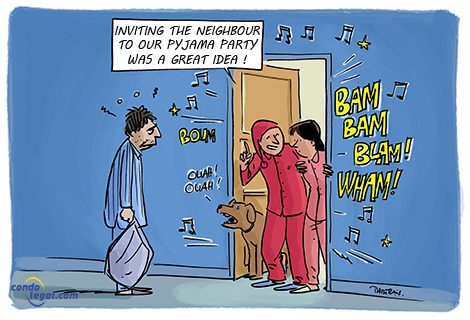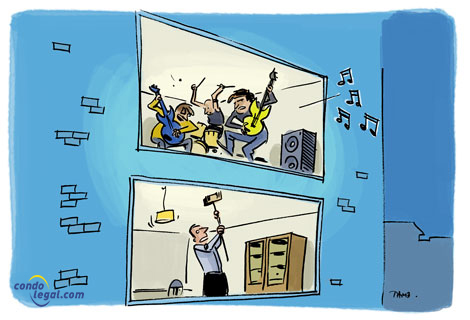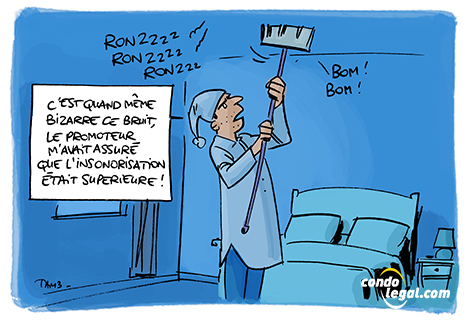Date published: 29/12/2024
Intolerance in co-ownership: a jurisprudential lesson

Living in a co-ownership involves striking a balance between enjoying one's unit and respecting the neighborhood. But what happens when this balance is disrupted by excessive and persistent behavior? A landmark judgment sheds light on the legal consequences of disproportionate intolerance in a co-ownership setting. This case highlights how crucial it is to respect the rights of other co-owners to maintain collective harmony. Courts can intervene decisively to address abuse and restore balance within the community.
Timeline of a conflict
In a co-owned building, a newly settled couple begins renovation work in their unit. The very next day, long-standing neighbors file a noise complaint. Although the couple adjusts the work schedule to minimize inconvenience, complaints multiply, even escalating to demands for complete silence as early as 8:30 PM.
Progressively, tensions escalate. The neighbors' behavior turns into harassment: unauthorized intrusions into the new residents' unit, repeated interruptions during friendly or family gatherings, and public humiliation. The situation reaches a critical point when one member of the couple decides to purchase a piano, provoking fierce opposition from the neighbors, even though no other residents in the building have expressed any complaints.
Legal action to end harassment
Faced with this unbearable situation, the couple, now plaintiffs in the case, decided to turn to the courts. They alleged a violation of their privacy as well as their right to peacefully enjoy their unit, rights protected by:
Legal analysis and court findings
The court concluded that the neighbors, now defendants in the case, had exceeded the boundaries of tolerance normally expected in co-ownership, particularly in an urban setting. The court's findings included:
- Baseless complaints: The defendants' numerous complaints were driven by unreasonable intolerance.
- Faulty behavior: Intrusions, intimidation, and repeated humiliations constituted genuine moral harassment.
- The plaintiffs' good faith: The couple demonstrated good faith by adopting a conciliatory attitude in line with the usual norms of co-ownership
Relying on the principles of good faith (article 6 of the Civil Code of Quebec) and balance in the exercise of property rights (article 1063 of the Civil Code of Quebec), the court determined that the defendants had failed to fulfill their legal and contractual obligations. Furthermore, under article 1457 of the Civil Code of Quebec, the court recognized a fault causing harm:
« Every person has a duty to abide by the rules of conduct incumbent on him, according to the circumstances, usage or law, so as not to cause injury to another. »
Damages: Redress and a warning
Dommages moraux
Moral Damages
The plaintiffs initially sought $20,000 for the harm suffered. The court awarded them $5,000, finding that the defendants' prolonged behavior had caused significant stress and impacted their quality of life.
Punitive Damages
Regarding punitive damages, the court found that the defendants had acted intentionally, with malice and bad faith, infringing upon the plaintiffs' fundamental rights. In accordance with Article 49 of the Charter and Article 1621 C.c.Q., it awarded $2,000 to deter such conduct from recurring:
« The defendants must be deterred from continuing to act in this manner. Punitive damages are intended to prevent the recurrence of their wrongful behavior.»
An injunction to restore order
In addition to damages, the court issued a permanent injunction prohibiting the defendants from continuing their wrongful behavior to restore peace in the building.
A lesson to remember
This decision sends a clear message: living in co-ownership requires respecting the rights and obligations of all parties. Excessive intolerance, even under the guise of seemingly legitimate complaints, can lead to serious legal consequences. This judgment underscores the importance of harmonious cohabitation and serves as a warning to anyone considering harassing their neighbors under the pretense of minor inconveniences.
To consult the judgment: Noël c. Lapointe, 2017 QCCS 3939
Yves Joli-Coeur, Ad. E.
Lawyer
Dunton Rainville
3055 Boulevard Saint-Martin O
Bureau 610
Laval, QC H7T 0J3
Tél. : (450) 686-8683
Courriel : [email protected]
Chronic express the personal opinions of the author and in no way engage the responsibility of the site editor , CondoLegal.com Inc. The content and opinions expressed in a column are those of the author.
Back to chronicles



